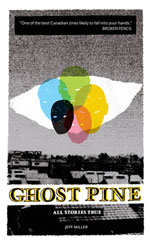
A brief synopsis of The Death of Donna Whalen would seem simple on the surface, and would also seem to separate swiftly those who would read such a story from those who would not. Based on a true case, the story is about a spirited but troubled young woman who meets a premature and very violent end. Her troubles prior to her death included dealing in behaviours and with people who were truly or reputed to be dangerous. It would seem clear who was responsible for her death. End of a cautionary tale, grimly told …?
Not at all. Drawing on a daunting array of records from the real-life trial of the suspected murderer – court transcripts, police wiretaps, police and news reports, letters, diary excerpts and more – author Michael Winter has distilled them into a singular account of a murder case and its attendant tragedy that is not at all what it seems. Its transcendent approach to capturing this story should and will also draw in readers to the book who might normally eschew “true crime” fare. Winter’s innovation is that he has created an unlikely Greek chorus out of the voices that emerge from the towering stack of material that apparently lived at the back of his closet for a number of the years during which he grappled with how to tell the story. Further, out of the cacophony of confused, fearful and duplicitous voices telling their versions of Donna Whalen’s story and fate, Winter forges a distinct voice of his own. The alchemy is that he takes first person accounts, compresses them, and sensitively and acutely converts them to the third person, while still retaining accents, inflections and resonances that create an unforgettable collective voice that haunted this reader in her dreams. The result is simultaneously intimate, distancing and authentic, making the story that much more compelling. The final effect also likely replicates the maddening conundrum that law enforcement, investigators and ultimately justice faced and struggled with in arriving at their flawed conclusions. Many of the relationships between voices and figures in the story are not explained until the end of the book. While this creates some confusion, it also adds to the effect of there not seeming to be a single, reliable voice telling Donna’s story. The reader struggles with her own trust and skepticism – which can change in waves from character to character, and from moment to moment with given characters – that is almost visceral, and therefore that much more intensely engaging. Winter himself, as well as reviewers, have cited Truman Capote’s In Cold Blood as a point of reference and comparison for The Death of Donna Whalen. While Donna is equally groundbreaking in form, the book is really closer in spirit, form and voice to Kenneth J. Harvey’s Inside. Donna‘s collective voice is as pervasive, haunting and mercurial as Inside‘s beleagured Myrden. Winter as author and narrative voice is often charmingly, gregariously present in his previous books, such as This All Happened and The Architects Are Here. His presence in The Death of Donna Whalen is deceptively influential, but also respectfully circumspect. It will be interesting to see what Donna does or does not do with his voice in future works. Even if Donna stands alone in his oeuvre … well, it truly stands alone, in every good sense of the phrase. See also Michael Winter recently talked most revealingly about his new book “The Death of Donna Whalen” on CBC Radio’s The Next Chapterhttp://www.cbc.ca/thenextchapter/2010/10/michael-winter.html

